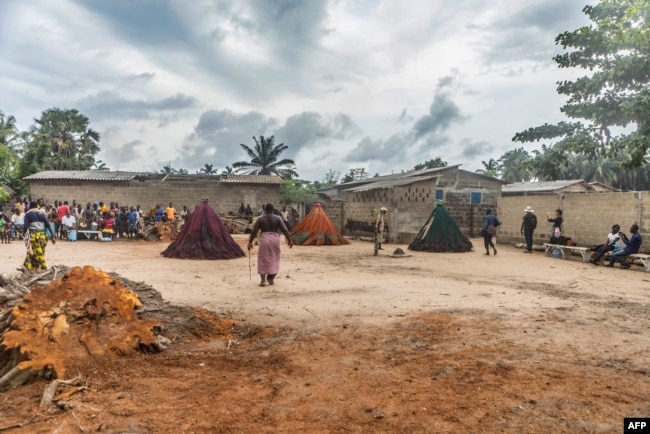Zangbeto: Voodoo Savior of Benin's Mangroves

The Zangbeto — the traditional voodoo guardian of the night — once policed the streets to maintain law and order and scare away its enemies.
But the revered deity, which is still feared and rules on village disputes, is now working to protect the rich mangrove ecosystem from threats from humankind.
The nightwatchman drifts along the shoreline in torrential rain to the rhythm of traditional chanting. A group of followers hangs two smaller representations of the god from the trees.
The mangrove in the delta acts as a spawning ground for fish and crustacea but is at risk from overfishing and the hunt for firewood.
Between 1995 and 2005, the maze of forest has shrunk from 13,000 to 9,000 hectares (32,000 to 22,000 acres).
Since then, some has been reforested by local non-government organizations, including Eco-Benin, a local non-profit which uses indigenous beliefs to promote conservation.
Alongo, a narrow strip of land that separates the river from the Atlantic Ocean, is home to 200 people who have become devout conservationists.
"From today, no one can enter this forest," says Jean Koukpomi, the voodoo priest conducting the ceremony.
"People used to come with their machetes to take the wood. They picked up the crabs, birds eggs... Now it's forbidden."
- Talisman -
Next to the priest is village head Damien Egbenou, with a pagne loincloth tied around his waist.
"If you go into the forest, you will be punished by the laws of our talisman. You can be beaten in front of everyone. He is feared."
It was residents of Alongo who decided to use the Zangbeto as a conservation tool.
"It has been a participatory process," said Sylvain Daavo, who worked on the project. "They told us if you want it to be sustainable, the deity must intervene," he said.
"Local people already practiced sanctification, which is called 'vodounto' and which means 'this part of the river belongs to voodoo.'
"That allowed the resources there to be protected."
Eco-Benin has been working in the area since 2011.
"If you come early in the morning, there are thousands of birds, there are migratory species and it is very valuable for the environment," said the group's national coordinator, Gautier Amoussou.
Two years ago, the non-profit created a biosphere reserve recognized by the U.N. cultural and heritage body UNESCO covering 17 villages, including Alongo.
Zangbeto has already "sanctified" eight sites over 500 hectares.
On the walls of the houses in the village, posters remind the inhabitants of the new rules: no hunting manatees or using chemicals in fields near the river.
- Divine sanction -
For years, conservation efforts have been at odds with the traditional way of life in Benin, where poor communities survive off fishing and cook over wood fires.
Fear of divine sanction appears to be much more persuasive.
The national plan for the sustainable management of mangroves approved by Benin's government also advocates using traditional beliefs as a means of protecting biodiversity.
The Mono River delta reserve is divided into three categories: protected zones, sanctified zones reserved for research and ecotourism, and buffer zones where human activity is regulated.
"We accept the initiative because we are given the opportunity to live in our own environment," said Dossou Viho, president of the Doukpo association, which manages the reserve and carries out patrols in coordination with the authorities.
"There is no disorder where the deity is present. Today we know that we must save our mangroves for the well-being of our locality."
At the same time, the community is focusing on tourism development with the recent creation of an eco-lodge and training for environmental supervisors.
Julien Kassa is a fisherman but now also offers tours to tourists visiting the Mono River.
In his yard, where the walls are covered with philosophical writing, he says his work protecting the mangrove has got him on the wrong side of some villagers.
But his efforts to raise awareness and voodoo have found in his favor,
"It is a great wealth," he says. "It's good for our development."






Leave a Comment